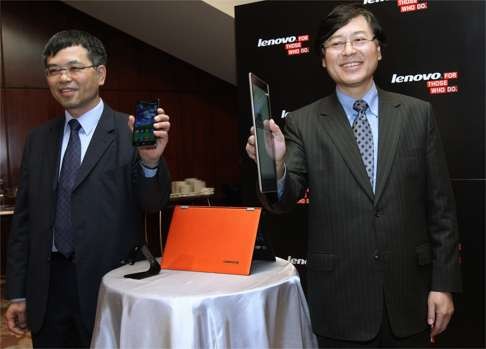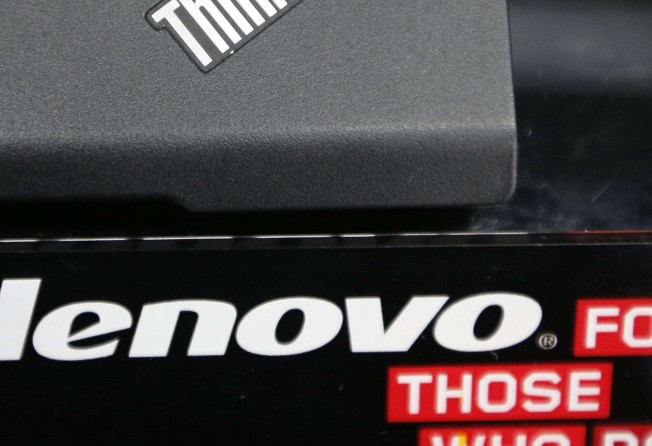
China’s Lenovo takes aim at smaller, diverse deals for newly formed venture capital unit

Computer giant Lenovo Group, which has pulled off some of the mainland’s biggest cross-border technology mergers and acquisitions, is now targeting smaller and more diverse deals around the world.
The world’s largest supplier of personal computers unveiled last month a sweeping organisational revamp that included the creation of a venture capital unit, the Lenovo Capital and Incubator Group, replacing its Ecosystem and Cloud Services operation.
“We see lots of potential for Lenovo to excel in identifying very good business opportunities among start-ups,” chief financial officer Wong Wai-ming told the South China Morning Post.
“We’ve always had these activities, but now we want to put a lot more focus and resources [into them]. This is a global business because there are many technological developments to find around the world.”

Lenovo, which operates in more than 160 countries, is making this foray in the global venture capital market after a record-setting year for the industry.
Venture capital-backed companies last year raised an all-time high US$182.5 billion across 7,872 deals, up 44 per cent from US$89.4 billion in 2014, according to a report from advisory firm KPMG Enterprise and investment database CB Insights.
But the report forecast a drop-off in venture capital investment this year.
“An uncertain global economy, a projected slowdown in China and expected interest rate increases following the recent increase in the US seem to be driving some investors to hold back their investment dollars,” it said.
Lenovo, however, is rushing into a market where angel investors might fear to tread. Its new incubator group is led by a the experienced George He Zhiqiang.
He, who joined Lenovo in 1986, led the previous ecosystem and cloud services business unit and had also been behind the creation of the company’s research and development operations, has also taken on the role of acting chief technology officer.
His mandate is to focus on developing innovative technologies through investments in standalone start-ups and potential corporate spinoffs, while develop the company’s cloud computing and big data activities.
“We are definitely aware of the changes in the market environment,” Wong said. “But in the internet age, we see many entrepreneurs who want to leverage the Lenovo platform.”
“The primary motive for us is to be able to leverage the technology these early-stage companies develop, so we can apply those to our businesses. Obviously, we’re also aiming for a solid financial return if we are able to identify some very good start-ups”
That platform includes the company’s core cash-generating personal computer group and the data centre and mobile business groups, as well as the new capital and incubation operation.
In addition, Lenovo has a formidable manufacturing base on the mainland, a vast supply chain network, international research and development facilities, and various technology, retail and professional services partners.
“We offer intellectual property protection, distribution capability and a strong brand. It’s a very solid business platform for any technology start-up,” Wong said.
“The primary motive for us is to be able to leverage the technology these early-stage companies develop, so we can apply those to our businesses. Obviously, we’re also aiming for a solid financial return if we are able to identify some very good start-ups.”
The track record of Lenovo shows that it has never been afraid of significant deals, including the mega-merger that catapulted it into the big league.
Before internet giants Alibaba Group, Baidu and Tencent Holdings emerged as major players in cross-border technology mergers and acquisitions, Lenovo had been on the global path.
In 2005, it acquired the personal computer division of International Business Machines for US$1.75 billion.
Then in 2014 it bought smartphone supplier Motorola Mobility from Google for US$2.91 billion and the commodity x86 server business of IBM for US$2.1 billion.
“When markets change and technology advances, we have to look at all opportunities. We can’t do everything by ourselves,” Wong said.
Building a diverse ecosystem of business partners, affiliated companies and brands at home and abroad is a strategy that Baidu, Alibaba and Tencent have also adopted, buying small equity stakes in upcoming start-ups or taking over companies.
“That is something we definitely want to achieve as well,” Wong said.
“The Lenovo capital unit is looking at early-stage technology companies in which we can buy between a 10 per cent and 50 per cent stake, or more than 50 per cent in certain instances.”
Berstein Research senior analyst Alberto Moel has described Lenovo’s capital and incubator group as “a me-too move,since everybody else is doing the same thing”.
Wong said that Lenovo is well aware of the challenges it faces.
“Right now, everybody is focusing on fintech. Several quarters ago, it was O2O (online-to-offline) services,” he said.
“We will need to focus in areas that will bring a lot of value to our customers. We are looking for professionals and entrepreneurs to join us.”